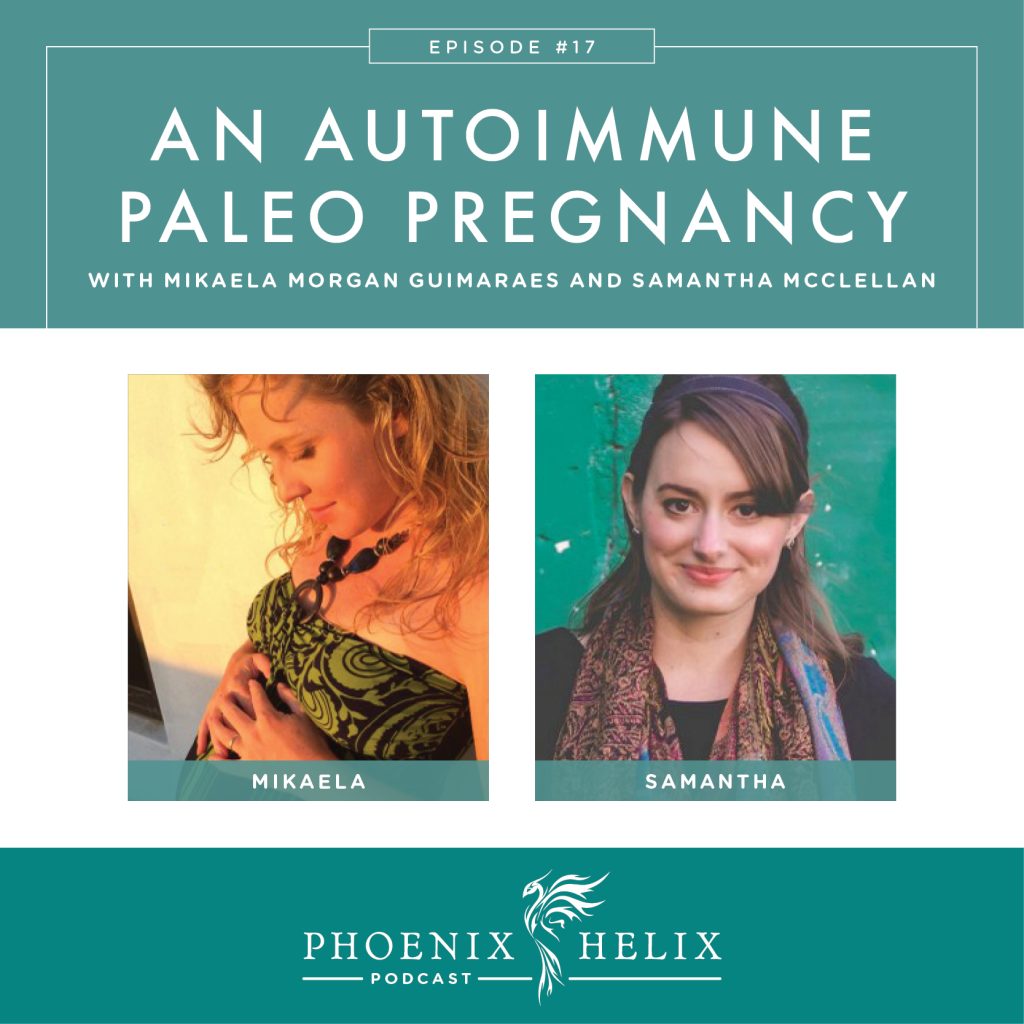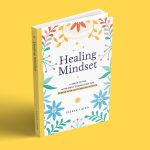
Doing Your Best for You and Your Baby
Many people find it easy to stay paleo before pregnancy, but during pregnancy, it’s a lot more challenging. We’ll be talking about why that’s so, and advice for doing the best you can, for yourself and your baby. This is a NON-judgmental podcast. Paleo perfectionism and pregnancy don’t always fit well together. We’ll also talk about how pregnancy affects autoimmune disease, and why some people go into remission, while others flare. We’ll also share tips for healthy choices for every trimester and labor itself.
Listen to the Show
- Subscribe to my podcast through your favorite podcast app: iTunes, Stitcher, Google, TuneIn, Spotify, Amazon, etc.
- You can also listen to the episode right here through the player below, and if you subscribe to my newsletter you’ll get notified of future episodes.
Podcast: Play in new window | Download
Show Notes
- Intro (0:00)
- Meet Our Guests (0:51)
- Mikaela Morgan Guimaraes has Crohn’s disease and is 7 months pregnant. Prior to getting pregnant, she had been following the paleo autoimmune protocol for two years. Before the AIP, her immunosuppressant medication had stopped working and her symptoms included severe abdominal pain, joint pain, she was 30 pounds underweight, and she was going to the bathroom 20-30 times a night. It took her a full year to see improvements on the AIP, but she stuck with it, and her symptoms eventually went away altogether. Some have now returned with the hormonal fluctuations of pregnancy.
- Samantha McClellan has ulcerative colitis. She’s also a Birth Doula and will be providing the professional perspective for our show today. Disclaimer: Samantha isn’t a doctor, so please take her advice as that of an informed friend, and ask your doctor about your healthcare decisions.
- Pre-pregnancy Nutrition (7:26)
- Samantha: Focus on nutrient density, incorporating things like leafy greens, bone broth, seafood and organ meats. She also recommends the following supplements: a quality prenatal vitamin: either Thorne Basic Prenatal or Optimal Prenatal, both of which are allergen-free and contain the active forms of B vitamins. A quality probiotic like Genestra Maternity. And Magnesium.
- Mikaela: Mikaela ate a very nutrient-dense diet prior to pregnancy and does take a prenatal vitamin. She got pregnant quickly after going off birth control. Some people with autoimmune disease find it harder to get pregnant; if that’s you, please listen to Episode 13 of this podcast: Autoimmunity and Infertility, for lots of helpful advice.
- 1st Trimester (13:46)
- Samantha: 90% of pregnant women experience nausea and protein aversion. It’s a normal response to the hormone fluctuations during pregnancy. However, nausea worsens when blood sugar drops, so keeping blood sugar stable by eating plenty of healthy fats with your carbohydrates is helpful. Other things that can help with nausea are drinking ginger tea, or smelling lemon essential oil. Regarding the protein aversion, take comfort in the fact that it’s temporary and you will make up the nutrition in the second trimester. Eat a wide a variety of starchy vegetables and fruit, rather than the same ones all the time. Always add fats. Drink bone broth and soups, if you can.
- Mikaela: She experienced nausea for 5 months, but found that if she forced herself to eat some protein, it made the nausea go away faster. Nausea was worse when she let herself get hungry, so she got in the habit of eating frequent small meals, which helped.
- Pregnancy Remission vs. Flares (19:28)
- Mikeala: She flared toward the end of her second trimester, which she believes was brought on by stress. She’s not one of the lucky women who go into remission.
- Samantha: While we know that hormones affect autoimmune expression, we don’t yet understand it well enough to predict it or prevent it. Some people’s symptoms get better and others get worse when pregnant, and the same thing can happen after delivery. Some research suggests it’s disease-dependent – that people with rheumatoid arthritis or multiple sclerosis are more likely to go into remission during pregnancy, while people with lupus are more likely to flare. Pregnancy is an immune-suppressed state, to allow the baby to grow inside you, so be aware that food reintroductions during pregnancy aren’t accurate, and you may not tolerate them after delivery.
- Staying Paleo (or Not) During Pregnancy (24:28)
- Samantha: If you’re finding sticking to the AIP too difficult, white rice and scrambled eggs are two foods many people tolerate well during pregnancy. White rice is starchy (which people crave) and egg yolks are nutrient-dense.
- Mikaela: She found it easy to stay AIP prior to pregnancy and was humbled by how hard it was to continue after pregnancy. She ended up expanding her diet with those very foods Samantha recommended: white rice, pastured eggs, and also ghee. She has been able to stay gluten-free and mostly AIP.
- Eileen: If you’re craving things like oatmeal and “cream of wheat”, there are some wonderful AIP-friendly cereal substitutes in this recipe roundup.
- How to Survive a Flare if You Have One (29:30)
- Mikaela: Hers happened in the second trimester, so she returned to strict AIP, ate bone broth veggie soups until the worst of it was over, and focused on stress management and taking care of herself emotionally. She also found it vital to let go of any self-blame for the flare. Two supplements she finds helpful for IBD flares are L-Glutamine and Prescript Assist.
- Eileen: Read my article of tips called How to Survive an Autoimmune Flare.
- Samantha: It’s hard for pregnant women who already have children to take the time for self-care and stress management, but it’s really important to make it a priority.
- Second Trimester Nutrition (35:15)
- Samantha: This is a good time to focus on nutrient-density, after the food aversions have passed. Be careful not to go too low-carb. The baby needs glucose to develop. She recommends 30% carbs, 20% protein and 50% fat.
- Third Trimester (37:06)
- Samantha: The mother’s organs get displaced to make room for the growing baby. This is why it’s difficult to eat large meals; it’s also why you have to go to the bathroom frequently. Insulin resistance is also a normal response to the hormone fluctuations of the 3rd trimester. Aim to eat 4-6 small meals during the day and overnight (eat when you wake up in the middle of the night). This will stabilize blood sugar and help you sleep better. Cut out desserts and load up on the protein, fat and safe starches. Choose low-glycemic fruits for sugar cravings like berries and grapefruit. And continue to focus on probiotics.
- Mikaela: She’s currently in her 3rd trimester. She’s eating lots of fresh seafood in Mexico. The Paleo Mom recommends seafood for women during pregnancy.
- Samantha’s Delivery Recommendations(42:53)
- Make sure you have plenty of support. Sometimes that might be your partner; other times it might be a friend or family member who has had a baby themselves.
- Choose your delivery location wisely. Questions to ask:
- Will you be able to eat and drink during labor?
- Do they require continuous fetal monitoring, or will you be able to get out of bed and move around when you want to?
- Do they have tubs and showers available in the rooms for pain management?
- Do they have a cap on number of people allowed in delivery room?
- Do they encourage breastfeeding?
- Do they separate Mom and baby after delivery?
- What is the hospital’s C-section rate?
- Are episiotomies routine?
- Consider free-standing birth centers as well as hospitals.
- Plan your labor and post-delivery food. You’ll need to eat, and the hospital food is unlikely to be paleo-friendly.
- Eating during early labor will give you the energy you need for active labor later. Some portable ideas are: dried fruit, applesauce, fruit and vegetable puree pouches, plantain chips, and sweet potato chips.
- Coconut water is an excellent way to stay hydrated and get needed electrolytes during labor.
- Post delivery, have a large, favorite meal in a cooler that someone can heat up for you. Labor is like a marathon, and you’ll be very hungry when it’s over.
- Lastly, have plenty of snacks and mini-meals available for your time in the hospital.
- Medical Tests (52:01)
- Glucose Test: It’s a test for gestational diabetes, and involves an artificial glucose solution that’s hard on the body. Alternatives are eating foods in your diet that equal 50-60 grams of glucose (3 bananas, or 16 oz. orange juice and a banana). Or to test your blood sugar at home with a diabetes test kit.
- Group B Strep: It’s a bacterial infection that can be fatal to the baby, so the mother’s vaginal canal is tested at the end of pregnancy, and if it’s found, IV antibiotics are recommended during labor and sometimes the baby is also given antibiotics after birth. Due to the high risk, Samantha recommends the test and the antibiotics when necessary. She recommends requesting a hep lock, so you don’t have to be hooked up to an IV throughout labor. She also recommends probiotics before, during and after delivery, and to consider probiotics for the baby as well.
- Outro (1:02:03)
- Update 2019: Samantha has moved to the NC Triangle and offers doula services through the Carolina Doula Collective. You can connect with Samantha on Instagram as well. She has retired from blogging.
- Update 2021: Mikaela retired from blogging and went back to school to become a nurse practitioner with a focus on functional medicine. You can still follow her on Instagram.
- Other Resources: Evidence-Based Birth.
- Eileen (your podcast host) is the author of multiple books, written to help people thrive with autoimmune disease. Learn more on the Books Page.
- If you like this podcast, follow or subscribe through your favorite podcast app. You can also subscribe to Eileen’s biweekly newsletter.
- Check out the entire archive of podcast episodes.
You May Also Be Interested In
Spreading the Word
If you like the podcast, please leave a positive review in iTunes. It would mean the world to me, and also helps others find the podcast. Here are some quick instructions using your iPhone:
- If you are already subscribed to my podcast: (1) Click the purple podcast icon. (2) At the bottom of the screen, click Library. (3) At the top of the screen, click Shows. (4) Click the Phoenix Helix podcast image. (5) Scroll down the page, and you’ll see Ratings and Reviews. Scroll down a little bit more and click on Write a Review. This will bring up the review screen. Tap 5 stars (if you love the podcast), and then click in the title box, and it will bring up the keyboard. Enter a title and short review. (6) Click Send in the upper right corner. (7) Thank you! Positive reviews give the podcast a higher search ranking in iTunes, helping people find it and letting them know it’s a quality podcast and worth their time to listen.
- If you haven’t subscribed to my podcast: (1) Click the purple podcast icon. (2) In the lower right corner, click the magnifying class. (3) Type Phoenix Helix in the search box. (4) Click the podcast cover in the Show list. (5) If you’d like to subscribe, click the + sign at the top of the screen. (6) To write a review, scroll down the page, and you’ll see Ratings and Reviews. Scroll down a little bit more and click on Write a Review. This will bring up the review screen. Tap 5 stars (if you love the podcast), and then click in the title box, and it will bring up the keyboard. Enter a title and short review. (7) Click Send in the upper right corner. (8) Thank you! Positive reviews give the podcast a higher search ranking in iTunes, helping people find it and letting them know it’s a quality podcast and worth their time to listen.









Can you repost your link for magnesium? It no longer works.
Hi Chelsea. Here you go: https://amzn.to/2CTUlIE
What were the prenatal.and fish oils recommended?
I’ve linked in the show notes above to all products recommended, Larken.
Can you recommend a prenatal that is ok on the Autoimmune Paleo diet? I’m having a hard time finding one without cellulose. I have Interstitial Cystitis so Vitamin C or citrus can cause me pain if it’s in large amounts.
Hi Shenna. Cellulose doesn’t need to be avoided on the AIP. You just need to look for allergy statements on the bottle to be sure it isn’t sourced from non-AIP ingredients. The prenatal vitamin Samantha recommended in the podcast is Thorne Basic Prenatal. It does have 50 mg of vitamin C per capstule, which is a small dose for most people, but I don’t know if that’s too much for you? Unfortunately, I don’t have any other prenatal supplement recommendations.
Hi Ellen! I’m 27 and have had RA for 10 years now. Would love to hear more about your story. Do you take any meds at present, or did you come off any etc?
Hi Alanna. You can read my story here on my blog: part 1, part 2, part 3.
Thank you posting this article, as well as the podcast. I’m having a difficult time sticking with AIP during my pregnancy, and my body is letting me know! Bless all of the beautiful mom’s out there that have this one more thing to take on! It’s all worth it in the end though!
Congratulations on your pregnancy, J! I agree – it IS hard and it IS totally worth it in the end. I hope some of the podcast suggestions help!
This is super helpful! I’m 34, have had juvenile arthritis for over twenty years and am pregnant with my first child!
Congratulations on your pregnancy, Ellen! Wishing you and your baby health and love.
This was a great episode! Great advice even for non-AIP Paleo lifestylers. I also want to say THANKS, Eileen, for writing up such detailed show notes! I listened in my car and was about to re-listen to take notes…when I found out you did it for me! Thank you!!
Thanks, Erin! Sometimes I think I go a little overboard with these show notes, but I can’t seem to help myself. 🙂
Notes are great! I haven’t found myself to be an awesome podcast listener, but I’m a fast reader and skimming through the notes helps me tremendously! I am anticipating baby #3 within the next 4-5 weeks and the info about flares, packing food and snacks for the hospital are very helpful! I can’t quite figure out what mini-meals might be helpful to have packed/frozen ahead of time, though. Any thoughts? I was thinking chicken soup, and hopefully my husband can run to Chipotle sometime afterwards to pick me up a carnitas bowl (with white rice, with which I seem to do fine), and I can pack fruits and maybe some veggies, but I’m drawing blanks on other good foods to have pre-made and ready to munch on, that will also sound appetizing and rewarding after delivery!
Hi Megan. I’m so glad you found the notes helpful. That’s why I make them so detailed – I want my blog readers to get the information alongside my podcast listeners. While some people are both, I know not everyone is. That’s a good question about which food to bring with you. If you want to make it super easy, you can order some Paleo on the Go AIP Frozen Meals. Otherwise, I think chicken soup sounds great. Some other recipes I like that I think would freeze and reheat well are: Pot Roast with Holy Grail Gravy, Roast Pork with Onion Apple Gravy, and Carrot Ginger Halibut Soup. Blessings on your growing family!